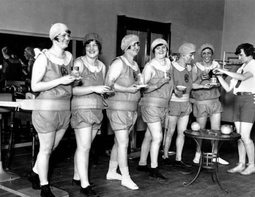The 7 Habits of Highly Effective Weight Loss Maintainers

It’s easy to lose weight. The hard part is keeping the weight off.
About 1 in 5 overweight or obese Americans successfully loses weight and keeps the weight off. What if you could survey thousands of these successful losers to determine what habits they have in common — essentially crowdsourcing their top tips for weight loss success?
This is exactly what the National Weight Control Registry (NWCR) is doing. The NWCR is a database founded in 1994 by Rena Wing, Ph.D., of Brown University, and Jim Hill, Ph.D., of the University of Colorado. The NWCR was established to answer two key questions:
- Are there people who have successfully maintained a substantial weight loss? (Yes!)
- What common characteristics and strategies have helped these people achieve and maintain weight loss?
To be eligible for the NWCR, participants have to be 18 years of age or older, and have lost a minimum of 30 pounds and kept the weight off for at least 1 year. The registry now has more than 6,000 ‘losers’ who have lost an average of more than 60 pounds, and have kept off the weight for more than 5 years! (Almost 20% of NWCR participants have lost 100 pounds or more.)
These volunteers have answered questions about their eating behaviors, physical activity, and other habits. Thus most of the information is based on self-reports. About 90% had lost weight before, but had regained it (the average lifetime weight loss was 270 pounds over several previous attempts).
What’s different this time? The participants cite medical, emotional and/or social reasons or triggers for their successful loss and maintenance. They are committed to making — and keeping — behavioral changes that influence both the calories they consume and the calories they burn off.
7 Habits of Highly Successful Weight Loss Maintainers
1. Engage in regular physical activity.  More than half of the NWCR members burn more than 2,000 kcal week. This is about 200 minutes a week (30 minutes/day) of moderate-intensity exercise. Popular activities include walking, stationary and/or road cycling, aerobics, walking or running on a treadmill, jogging, and strength training.
More than half of the NWCR members burn more than 2,000 kcal week. This is about 200 minutes a week (30 minutes/day) of moderate-intensity exercise. Popular activities include walking, stationary and/or road cycling, aerobics, walking or running on a treadmill, jogging, and strength training.
200 minutes a week is not a lot, and is just a bit more than the 150 minutes a week recommended in the U.S. Physical Activity Guidelines for Americans.
How many minutes of physical activity do you engage in each day? Can you add in 5–10 minutes a few days a week?
2. Limit television watching. About 63% of NWCR members report watching less than 10 hours a week of television (less than 1.5 hours a day on average).
 According to the Bureau of Labor Statistics, Americans watched TV ~19 hours/week (2.7 hours a day) on average in 2010, while Nielsen pegs the number at ~32 hours/week (more than 4.5 hours a day) across ages 2 and up. How many hours a day do you spend watching TV?
According to the Bureau of Labor Statistics, Americans watched TV ~19 hours/week (2.7 hours a day) on average in 2010, while Nielsen pegs the number at ~32 hours/week (more than 4.5 hours a day) across ages 2 and up. How many hours a day do you spend watching TV?
3. Eat a low-calorie, low-fat diet. NWCR members report consuming 1,380 kcal/day, with less than 30% of the calories coming from fat. When shopping, they often reach for foods (such as salad dressings, dairy, and soft drinks) that have been modified to contain less sugar and fat.
A typical diet is assumed to be around 2,000 calories a day, but when it comes to calories, it’s definitely not ‘one size fits all.’ You can calculate the estimated calories you need each day, plus receive a daily food plan at Choose My Plate, from the USDA.
4. Eat a consistent diet and don’t splurge. NWCR members tend to eat the same foods regularly. They prepare most of their meals at home and typically have less than one fast food meal a week. They don’t splurge on high-calorie foods on weekends, holidays, or other special occasions.
 5. Eat breakfast. Almost 80% of NWCR members report eating breakfast every day. This habit may help control hunger and prevent them from overeating later in the day.
5. Eat breakfast. Almost 80% of NWCR members report eating breakfast every day. This habit may help control hunger and prevent them from overeating later in the day.
6. High dietary restraint and awareness. NWCR members maintain control over what they eat. They don’t eat something in response to their emotions, or just because it’s there.
7. Self-track. More than half of NWCR members weigh themselves at least weekly and track their daily food intake. They also tend to monitor their calories and/or fat grams.
 Do you track? What method do you use? Have you tried an app, or the online USDA SuperTracker?
Do you track? What method do you use? Have you tried an app, or the online USDA SuperTracker?
The successful losers combine physical activity and diet. They use their leisure time wisely, engaging in physical activity instead of sedentary activities, such as TV watching. They exhibit restraint. And they stay on track with self-tracking.
What works (or doesn’t work) for you?
If you are a successful loser, you are invited to join the study: http://www.nwcr.ws/
Related posts
- Childhood Obesity By The (Big) Numbers
- Twelve Everyday Health Rules–From 1908
- Kids and Media Use: Letting their fingers do the walking?
- Self-tracking, Sensors, and mHealth: Trends and Opportunities
- 12 real foods for real results: Insider tips from top sports nutritionists
- Self-Tracking Meets Ready-To-Wear: Make Room in Your Closet for Smart Clothes
Photos
- Two women: istockphoto
- V a u h d i k a s [bike] courtesy of Pörrö at Flickr
- Remote courtesy of kevinthoule at Flickr
- Banana courtesy of the USDA Fruit Food Gallery
- Zero Gravity [scale] courtesy of mrjorgen at Flickr
Reference
Graham, T.J., Bond, D.S., Hill, J.O., Wing, Rena R. The National Weight Control Registry: A Study of “Successful Losers.” ACSM’S Health & Fitness Journal, 15 (2) pgs 8-12, 2011.
doi: 10.1249/FIT.0b013e31820b72b5










Trackbacks & Pingbacks
[…] The 7 Habits of Highly Effective Weight Loss Maintainers […]
[…] The 7 Habits of highly effective weight loss maintainers […]
Leave a Reply
Want to join the discussion?Feel free to contribute!